Country profile: Angola
The oil-rich African state goes to the polls on August 31.

Angola, a southern African country with a population of about 19 million, is about twice as big as France. Angola is the second-biggest oil producer in Africa, behind Nigeria.
The country borders Namibia to its south, Zambia to the east, and the Democratic Republic of Congo to the north.
History
Angola had been ruled by Portugal for about four centuries. After Angola won its independence in 1975, the People’s Movement for the Liberation of Angola (MPLA), a Communist movement backed by the Soviet Union, took control. But a brutal civil war raged in Angola for 27 years between the MPLA, the National Union for the Total Independence of Angola (UNITA), and the National Liberation Front of Angola (FNLA), the latter two backed by the US and China.
| QUICK FACTS |
|
Capital: Luanda Language: Portuguese (official) Religion: Roman Catholic (55 per cent), animist Per capita national income: $3,940 (2010) GDP growth: 3.4 per cent (2011) Life expectancy: 51.1 years Sources: World Bank, UN |
The lengthy war devastated Angola. It resulted in 500,000 deaths and displaced 4 million Angolans, besides leaving the country full of landmines.
A peace agreement was reached in 1991 between the MPLA, lead by Jose Eduardo dos Santos, and UNITA, headed by Jonas Savimbi. But Savimbi did not accept 1992 election results that showed the MPLA winning, and war erupted again. Savimbi was killed in 2002, after which a second peace was made.
Angola’s first general elections since the end of the civil war were held in 2008 and won overwhelmingly by the MPLA. Most international organisations praised the elections as generally fair, though Human Rights Watch was critical.
Campaigning for this year’s legislative elections began on July 31. Angola will vote on August 31 in polls that are expected to result in another victory for the MPLA. Elections in Angola are not direct: instead, the head of the party receiving the largest share of the vote will become president.
Angolan President Eduardo dos Santos has ruled for 33 years, longer than any other African leader except for Teodoro Obiang of Equatorial Guinea.
Economy
Angola is one of the world’s fastest-growing economies. A large oil producer and a member of oil cartel OPEC since 2006, most of Angola’s GDP comes from the oil sector. Much of the country’s oil reserves are found in Cabinda, an Angolan enclave wedged between Republic of the Congo and the Democratic Republic of Congo.
Most Angolan oil is exported to either China or the United States. The country is also rich in diamonds, phosphate, and iron.
Despite Angola’s valuable resources, most of its people live in poverty. The civil war greatly damaged the country’s infrastructure, and corruption and mismanagement remain a drag on the economy. Foreign companies are often reluctant to invest.
The oil boom has made Luanda, the capital, one of the most expensive cities in the world for foreigners to live in, with apartments for rent at more than $10,000 a month. Meanwhile, however, most of the city’s five million residents are poor.
Foreign relations
During the Cold War, Angola was close to the Soviet Union, Cuba, and Libya. However, since the 1990s, Angola has developed stronger ties with the West.
Angola has intervened in the Democratic Republic of Congo’s civil war on the side of the government, led by Joseph Kabila. However, Angola-Congo relations have often been tense, as Angola has expelled thousands of migrants who came from the DRC, and vice versa.
Angola has a mutual defence pact and friendly relations with Namibia, its southern neighbour.